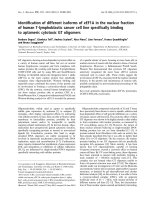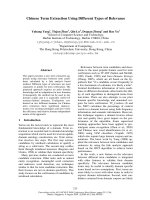Explain different sources of lawin england
Bạn đang xem bản rút gọn của tài liệu. Xem và tải ngay bản đầy đủ của tài liệu tại đây (2.24 MB, 27 trang )
<span class="text_page_counter">Trang 1</span><div class="page_container" data-page="1">
TASK 1:...3
1.Explaindifferent sources oflawin England ... 3
2.Definethe historyandcharacteristics of Common law;Explainthe difference betweenCommonlawandequity. ... 4
2.1.DefinitionofCommonlaw ...4
2.2.Thehistoryof Commonlaw ...5
2.3. Characteristics of Common law ...5
2.4. The difference between Common law and Equity. ...6
3.Explainthe role of government inlawmakingand how statutoryand common lawareappliedintheCourts ...7
3.1. The role of government in lawmaking ...7
3.2.Howstatutory and commonlaware appliedinthe Courts ...8
</div><span class="text_page_counter">Trang 2</span><div class="page_container" data-page="2">The legal system plays a vital role in shaping and governing businesses and organizations.Understandingthe natureofthe legalsystem, itsimpactonbusinesses, andtheformationofdifferenttypesoforganizations iscrucialforeffectiveoperations and resolving areas of dispute. In this essay, we will explore the legal aspects of variousscenariosinvolvingBromford,a housingassociation,an enterpriseinLondon, amedicalsuppliestradingcompany, andNTC Co., Ltd. Wewill analyzethe sources oflawin England, includingcommonlaw, equity, statutory law, and customary law. Additionally, we will examine the role of the government in lawmaking and the applicationofstatutory andcommonlaw inthecourts. Furthermore, wewill discuss the importance of contracts, their binding elements, and the necessity of written contracts.Movingforward, wewilldelveinto theconditions forvalidcontracts and themanufacturer'sliability insupplycontracts.Finally,we willaddressaspecific case involving NTC Co., Ltd., exploring dispute settlement methods available in Englandandrecommendinganarticleongoverninglaws anddisputesettlementthat best suits the customer's situation. Through these discussions, we aim to provide comprehensivelegalinsightsandrecommendappropriatelegalsolutionstoresolve areasofdispute.
</div><span class="text_page_counter">Trang 3</span><div class="page_container" data-page="3">1.ExplainExplainExplaindifferentdifferent sourcesdifferentsourcessourcesoooooffffflawlawinlawinEinEEngngnglandland
Thehistoryofhow England'slegal systemcame tobeisextensive andcomplicated. It datesbackto thePrehistoric era,whencommunal norms andcustoms servedas the basisforlegislation.However, with Norman influence in the11th century, sovereign lawdeveloped,addingtothecomplexityoftheEnglishlegalsystem.
IntheEnglishlegal system,thecommonlaw isasignificantsource oflaw.It was shapedbyrulings madebycourts inearliercases.These rulingsestablishbroad rules that can be used in future instances with a comparable set of facts. Contracts, organization,civilresponsibility,criminality,and manymoreareas aregoverned by sovereignlaw.The rulings ofthehighcourts,suchas theSupremeCourt,establish significantlegalprecedentsandhaveasignificantinfluence on Englishlaw. Statutorylawis anothersignificantsourceoflaw inadditiontosovereignty law.Acts ofParliamentandStatutory Instrumentsarehowstatutorylawisexpressed.Themost significant and frequent legislative documents that are enacted by the English ParliamentarecalledActsof Parliament.StatutoryInstruments, whichare published by additional legislative bodies like ministers and other authorities, are likewise bindingonthelaw.AllresidentsandenterprisesinEnglandmustabidebythelaw. Otherlegalsources,such as internationalconventionsand EuropeanCommunityLaw, inadditiontosovereign andofficiallaw, haveanimpacton Britishlaw.TheEuropean Community's order, which includes the EU's laws and regulations, also had a significantimpactontheBritishlegalsystempriortotheUK'swithdrawal fromthe EU(Brexit).Inareas likehumanrights,internationalcommerce, andtheenvironment, theinternationaltreaties towhichBritain isa signatoryalsosignificantlyinfluence Britishlaw.Inaddition, equitylawand legalprecedentsarethe foundationsof the Englishjudicialsystem. By offering remedieswheretherigid application of thelaw mightnotprovidefairness,equity lawis acomplementary andcorrectivelegal system that supports common law. Legal precedents are court rulings and accepted legal theoriesfromearlier casesthatserve asaguide forhow futurecourtswill handle issuesthatare similarto thoseinquestion.
</div><span class="text_page_counter">Trang 4</span><div class="page_container" data-page="4">Inadditiontostatutorylawandregulations,thelegalsysteminEnglandalsorelieson customary law and legal precedents. Customary law refers to rules and legal principlesthathave beenacceptedand followedovertime.These rulesare notcreated by legislation or statutory regulations, but rather develop from practice and agreements within the community. A typical example of customary law is the commonpracticein buying,renting, andcontracting.Legal precedentshave playeda significantroleinthe evolutionof Englishlaw.They includerulingsfromcourts as well as verdicts from earlier cases. The rulings of higher courts, particularly the SupremeCourt,set importantlegal precedentsandinfluence upcominglegislation. Legal precedents serve as an essential guide for resolving new cases, and they contributetotheconsistency andstability of theEnglishlegal system.
Overall,thelegalsystem inEngland isbasedon varioussources oflaw, including sovereignty law, statutory law, European Union regulations, international treaties, equitylaw,customarylaw,andlegalprecedents. Theinteractionandimpactofthese sourceshavecreated acomplex andflexiblelegal systemthatplays asignificant role in regulating and protecting the rights and interests of citizens and businesses in
Astheauthormentioned aboutCommonlaw above,Common lawisa systemoflaw thatisnotpredicated on legislationor regulationsbut ratheron tradition, normative writings,andcourtrulings. Itwas invented inEnglandand has since expandedtoa largenumberofnations,suchas theUSAand Canada.Asaresultof judges'rulings and interpretations in particular instances, common law develops, producing normativelegaltextsthatdirect subsequentjudgments. Asjudges have theauthority tointerpretandapplythe lawtoparticularinstances,it isknownfor itsadaptability and flexibility. The common law's guiding principles place a strong emphasis on uniformity,justice,andthesignificanceofstatutorylaw.Withthe helpofthissystem, lawsmaybecreatedto addressthedemands of a changing society.
</div><span class="text_page_counter">Trang 5</span><div class="page_container" data-page="5">2.2. The historyofCommon law
Commonlawhasa richhistory thatdates backto medievalEngland.Itemerged asa legalsystembased oncustom andtradition,gradually evolvingfromlocalpractices intoaunifiedlegal system.Duringthereign ofKingHenryII inthe12th century, therewereattempts toestablish acommon codeof law that wouldapply throughout thekingdom.The decisionsof the royal judgesandthe principlesthey appliedbecame thefoundationofcommonlaw.Overthecenturies,commonlawcontinuedtodevelop throughtherulings and precedentsset byjudges.These decisions wererecordedand followed as authoritative interpretations of the law. The doctrine of stare decisis, meaning "to stand by things decided," ensured that lower courts followed the precedentsestablishedbyhigher courts.Asthe BritishEmpirepropagatedcommon lawacrossmanyofitscolonies,itsimpactgrewbeyondEngland.Commonlawhas beenincludedasthe cornerstoneofothernations' legalsystems,including thoseof the United States, Canada, Australia, and India. In the modern era, common law has undergonesignificantdevelopments andadaptationsto address the complexitiesof contemporarysociety.Ithasbeensupplemented bystatutorylawandinfluencedby internationaltreatiesandconventions.However,the principlesofcommon law,such as the reliance on precedent and the flexibility of judicial interpretation, remain precedents, and customary practices. Unlike civil law systems that are based on comprehensivecodes,commonlaw developsthroughtheaccumulationofcase law andtheinterpretationofstatutesby courts. One ofits key featuresis the doctrineof stare decisis, which means that courts are bound by the precedents set by higher courts.Thisprincipleensuresconsistency andpredictabilityin the applicationofthe law.Incommon law,judgesplaya crucialroleinshaping legalprinciples through theirrulingsandinterpretations. Theirdecisionsbecomeauthoritative andserveas guidanceforfuturecases. Thisflexibilityallowsthe lawtoadapttochangingsocietal
</div><span class="text_page_counter">Trang 6</span><div class="page_container" data-page="6">needs and circumstances.Common law also places importance on the principle of equity, which seeks to provide fair and just outcomes in situations where strict application of the law may lead to injustice. Equity allows courts to exercise discretionandapplyremedies basedonprinciplesof fairness andconscience. Another characteristic of common law is its emphasis on individual rights and liberties.Itupholdstheprinciplethat individualsareinnocentuntilprovenguilty,and safeguards fundamental rights such as freedom of speech, religion, and property. Commonlawis knownforits adversarial system,where opposing partiespresenttheir casesbeforeaneutral judge.Thejudgeactsas animpartialdecision-maker,weighing theargumentsand evidencepresentedto reacha fairjudgment. Furthermore,common lawreliesheavily on the principleofprecedent.Courts areboundto followprevious decisions, creating a hierarchy of legal authority. This promotes consistency and stabilityinthelegalsystem.Commonlawisnotconfinedtoaspecificsetofstatutes orcodes.Instead, itevolves through theinterpretation and applicationof the lawin specificcases.Thisallows foradynamic andevolving legalframeworkthatcan adapt tosocietalchanges.
Overall, common law is characterized by its reliance on precedents, flexibility, emphasis on individual rights, and the principle of equity. It has influenced legal systemsaroundtheworld,particularly incountriesthatwere oncepartofthe British Empire,andcontinues to shapethedevelopmentof law inmanyjurisdictions. 2.4.ThedifferencebetweenCommon law andEquity.
CommonlawandEquity aretwoimportant conceptsinthe legalsystemsof many countries, especially those that have been influenced by the British legal system. Although both originate from the English legal system, they have significant differences.
Common law is a body of law that was established via court rulings and the consequencesofearliercases. Itis founded onlegal precedentsand ideas.Itplaces a strong emphasis on consistency and predictability, with previous instances being followedandusedtoinformsimilar situationsinthefuture.
Ontheotherhand,Equity isasupplementaryandcorrectivelegalsystemtocommon law.Equityfocuses onfairness and justice, aimingto ensurethat therules ofcommon law do not lead to unjust outcomes. It allows the courts to apply measures and
</div><span class="text_page_counter">Trang 7</span><div class="page_container" data-page="7">decisionsbasedon principlesoffairness andconscience, ratherthan strictlyadhering totherigid rules of common law.
AnothernotabledifferencebetweenCommonlawandEquityis theirlegalorigins. Commonlawderivesfrom legalprecedents andlegal principles,whileEquity evolves fromprinciplesoffairnessand conscience.However,inpractice,Commonlawand Equityarenotentirely independent.Thesetwosystems havebeenintegrated,and casesmayrequirethe application of bothtoensure fair andjustoutcomes.
An essential component of a nation's political and legal systems is how the government participates in legislative procedures. To control how people and organizationsbehaveinsociety,laws mustbe proposed,put intoeffect,andenforced bythegovernment.Herearesome ofthegovernment'smost importantdutiesinthe legislativeprocess.
First,newlawsandlegalpolicies areproposedbythegovernment. Thegovernment examines,investigates,andfinds anylegalvoidsorproblems thatneedtobe filledby newlegislativeinitiativesbasedonthe demandsandgoalsofsociety. Inorder to do this, the government must be aware of the social, economic, cultural, and other aspectsthataffect the rights andneedsof society's constituents.
Second,thelegislativeprocess isunder the controlof the government.Thisprocedure frequently involves legislative bodies like parliaments or representative councils, whosemembersarechosenorappointedto standupforcitizenrightsandtake partin the legislative process. In order to encourage the adoption of suitable laws and policies that are in line with the goals and demands of society, the government participatesinproposals, advocacy,the presentationofarguments, and negotiations.
</div><span class="text_page_counter">Trang 8</span><div class="page_container" data-page="8">Third,thegovernmentis in chargeofenforcingandputtinglawsinto practice.The governmentisresponsibleforensuring the application and compliance oflaws and policies.Establishingandrunning specializedorganizationsto overseeand manage theapplicationoflawsis partofthis.Through thecourtsystemand thecriminalcode, thegovernmentisalsoin chargeofmanaginglegal infractions.
Lastbutnotleast, thegovernmentis responsible forkeepinganeye onand assessing thesuccessoflaw. Todetermineifthe legislationeffectively satisfiesthegoals and demandsofsociety, thegovernmentmust continue itsinvestigation andobservation ofthesituation inreallife.The governmentis inchargeof revisingandalteringlaws asnecessaryto guaranteetheirefficacy andsuitabilityforsocietal developments. Tosumup, thegovernmentplays abigand variedrolein thelegislativeprocess. The government is in charge of ensuring that laws are made and applied fairly and effectivelytosafeguardrights andsatisfy societal requirements. Thisresponsibility extends from proposing and making suggestions through the legislative process, implementation,andenforcement.
Statutorylawandcommon law areboth importantinfluenceson courtdecisionsand judgements.
Statutorylawrefers tolaws thatare enactedbylegislative bodies, such asActsof Parliamentorstatutespassed by Congress.These lawsarecodified andprovideclear rulesandguidelinesforspecificareasoflaw.Whenacaseispresentedbeforethe courts, judges must interpret and apply relevant statutory law to determine the outcome.Theycarefullyanalyzethelanguageandintentofthestatuteandapplyits provisionstothefacts of thecase. Statutory law isimportantbecause it reflectsthe willofthelegislatureand representsaformalexpression of the law.
Ontheother hand,common lawrefers to legalprinciplesandrules thathavebeen developedandrefinedthroughjudicial decisionsovertime.Itisbased ontheconcept oflegalprecedent,where judges relyonprevious courtdecisions toguide theirrulings. Commonlawiscontinuouslyevolving andadapts tochangingsocietal valuesand circumstances. Judges interpret and apply common law principles by considering establishedprecedents,legal reasoning,and theparticular factsof thecase athand.
</div><span class="text_page_counter">Trang 9</span><div class="page_container" data-page="9">Commonlawprovidesflexibilityandallows forthedevelopmentoflegalprinciples inresponsetoemerging issues.
Inpractice,courtsapplybothstatutorylawandcommonlawintheir decisions.When alegalissuearises,judgesfirstlooktotherelevantstatutestodetermineifthereisa clearandapplicable rule.If the statutedirectlyaddresses theissue, thecourtapplies thestatute aswritten. However,statutes maynot cover every possiblescenario,and in suchcases,judgesturntocommonlawprinciplestofillinanygapsorambiguities. They examine precedents, legal principles, and analogies to develop a reasoned decisionthatalignswith legalprinciplesand societalexpectations.Theapplicationof statutory and common law in courts requires judges to engage in statutory interpretationandlegalreasoning.Theymust carefullyconsiderthelanguage,context, andpurposeof thestatute,aswellasthe evolvingbodyof commonlaw,toarriveata justandfair outcome.Ultimately, thegoal istoensure consistency, predictability,and the proper application of the law to the specific circumstances of each case. By harmonizingstatutorylaw andcommonlaw, courtscontribute tothe developmentand stabilityofthelegalsystem whileupholdingjusticeand the ruleof law.
1. TTThehehebindingbindingelebindingeleelementsmentsofmentsofof thethecontractthecontract
Contractsplayasignificantrole intheoperations and investmentsofacorporation. Contractsaregoverned bylawinthe UK,andseveral bindingprovisionsmust be observedto maintainthe legitimacyofthe business.
A contract's basic terms, such as its price, term, scope, and parties' rights and responsibilities,shouldbeclearly definedsince theyareamong themostsignificant bindingaspects.Thispromotesequity andopennessduringtheprocessof signingand carrying out contracts. Compliance with laws and regulations pertaining to the protectionoftheinterestsofbusinessesandconsumersisoneofthe otherlegally enforceablepartsofthecontract.Some particular elementsinclude:
-The contractmust abidewith alllegal requirements, includingthoseset forthin the lawsgoverningbusinessesandconsumerprotection.
</div><span class="text_page_counter">Trang 10</span><div class="page_container" data-page="10">- Contracts should be enforceable and enforceable in accordance with the law, includingtheright tohave judicialproceedingsor arbitrationusedtosettle disputes. -Contractsmustguarantee confidentialityandsafeguardsensitive databelonging to clientsandorganizations.Asaresult,thecontractmust includeclausesaddressing confidentialityandthe privacyofthisinformation.
-The contractshouldinclude clausesaddressing theenterprise'sobligation toensure thequalityofitsgoods andservices. Thisaidsin defending consumer interestsand ensuringthecaliberofthe company'sgoods andservices.
-Thecontractshouldincludeprovisions forchangeand terminationofthe contract,in the event of a change or termination of the contract. This helps to ensure the flexibilityandadaptabilityof thebusinessin emergingsituations andminimize risks fortheparties.
Toensurelegitimacyandsafeguard theinterestsof thebusinesswhileestablishinga businessintheUK, itiscrucialtoadhere tothecontractualprovisionsof thecontract. Customersmustthusexercise cautionand attention whensigning contracts,assuring thattheprovisionsupholdfairness,transparency, legality, and theprotectionofthe company'sinterests.Theclient needstodiscussand makechangestothe contractif thereisanyclausethatisunclearornotbindingonthe lawinordertomakesureitis suitableforhis particularbusinesscircumstances.Inorder toguaranteethe legalityof contract provisions and safeguard their interests in the UK, customers should routinelyevaluateandamend them inlight of themostrecent legal developments. Customersshouldalsobe awareoftheadoptionof policiestosafeguardintellectual property (IP) rights, such as copyright, trademarks, and licenses. This promotes credibilityandsafeguardstheinterestsof UKbusiness.
In general, to set up a business in the UK, customers need to pay attention to complyingwiththebinding elementsof theircontract andprotect theirintellectual propertyrights.Ifthesefactorsareproperlyandfullyimplemented,customerswillbe abletoachievelegality, protect theirinterests and increaseflexibilityin the processof doingbusinessinthe UK.
</div><span class="text_page_counter">Trang 11</span><div class="page_container" data-page="11">including separation of responsibilities between the company and individual owners,trustand reputationof the client and partners,andseparatelegal entity powersandcapabilities.A company incorporatedinLondoncan takeadvantage of an important global business and financial centre. This can provide opportunitiesforbusiness,fundingand partnershipswith localandinternational companies.
Employmentimpact:Setting up a businessinLondon createsjobopportunities for locals and international employees. The new company can create a large numberofjobsand contribute tolocal economic growth.Hiring staffinthe UK requires compliance with labor regulations and laws relating to employment, employment contracts, social insurance and minimum wages. This ensures fairnessandprotectstherightsofworkers.
Impact of contract law: A written contract between a company and its stakeholders is essential to ensure clarity and compliance with the law. For example,anemploymentcontractwillstipulate workingconditions, wages,rights and responsibilities of employees, creating a legal basis for a stable labor relationship. Contracts with business partners, suppliers or customers are also important to define the commitments and obligations of the parties, including pricing, terms, payment conditions, and return policies. A written contract providesalegalframework forresolvingdisputes,ifany.
Forexample,a start-upcompanyinLondon mightenterintoan employmentcontract withanewemployee. Thiscontract clearlydefines therights and obligationsof both parties, including salary, working time, leave policy and contract termination conditions.Thiscreatesa stableworking environment andensures the interestsof boththecompanyand itsemployees.In addition,thenewcompany mayalsoenter intoacontractwithabusinesspartnerorsupplier.Thiscontractdefinesthetermsof sale,therightsand obligations of both parties,includingprice,delivery time,and returnpolicy.Havinga writtencontracthelps ensure thatterms andconditions are properlyfollowedandprovideslegalevidencein theeventofa dispute.
</div><span class="text_page_counter">Trang 12</span><div class="page_container" data-page="12">Inanutshell,the London,UKstart-upwill havetodealwith theelementsofcontract constraints, employment impact and contract law. Making a written contract is necessarytoensureclarity,complywiththe lawandprotecttheinterests oftheparties
-Lawsspecifying therules and regulations that applyin the country or region in whichthebusinessoperates.In the UnitedKingdom,thelegal systemis diverseand includes legal sources such as legislation passed by Parliament and judicialism through court decisions. Compliance with the law is imperative and important in doing business. Failure to comply with the law may result in legal consequences, includingsanctions,fines,or loss oflicenseto operate.
- Regulations are rules and standards established by regulatory agencies and governmentstoregulate specific areas.They canapply tospecific industries,such as occupationalsafety,environment,taxation, intellectual propertyrights and consumer protection.Compliancewithregulationsis necessary toensurethat businessesoperate within legal boundaries and meet safety, environmental, social responsibility and customerrightsrequirements.
-Standardsare principles,regulations,and requirementsthat aredesigned to ensure quality,safetyandregulatorycompliance ina givenarea.Thesemayinclude product quality standards, manufacturing processes, safety regulations, environmental management,andconsumer rights.Achieving standardsrequirescompliance andthe ability to demonstrate compliance through testing, certification or inspection. Standardscanenhancethecredibilityofabusiness' productorserviceandprovidea competitiveadvantage.
Inshort,thelaws,regulationsandstandardsofdoingbusiness inthe UKplayan important role in ensuring legal compliance, meeting industry requirements and ensuring quality and safety. and comply with regulations. Understanding and complyingwiththese factorswillhelpbusinesses buildandmaintain astable business system,complywiththelawandcreate trustforcustomersandpartners.
</div><span class="text_page_counter">Trang 13</span><div class="page_container" data-page="13">4.
4.WhyWhyWhy isisis thethethecococontractntract requiredntractrequiredrequiredinininwrwritingwriting?????iting
SettingupabusinessinthecityofLondon,UK,customersneedtocomplywiththe bindingelementsofthe contract,includingclearly definingthe basicconditions ofthe contract,complyingwiththe law,protecting rightsintellectual property,ensuringthe confidentialityandprotectionofimportantbusinessandcustomerinformation,terms ofresponsibilityandassuranceofproduct/servicequality oftheenterprise,change andterminationmechanismterminatethecontract.
Makingawrittencontract isthebestwayto ensureaccuracy, transparencyandavoid disputesforbusinessesandcustomers. Bymakinga writtencontract,theterms and conditionsofthecontract willberecordedindetail, clearlyandunderstandabletothe parties.Ifthereis adisputeovertheperformanceof thecontract,thepartiesmayrely on a written contract to settle it. Making a written contract also helps to ensure legalityforbusinesses andcustomers. A writtencontract isa document thatproves whethertheinterestsofthepartiesinthecontract.Ifthecontractissignedinwriting, thepartiescan usethis contractto verifyifa disputearises. Ifthe contractisnot in writingandisonlyanoral agreement,itisdifficulttoprovetheconditions agreed betweentheparties.Oneoftheotherbenefitsofhavinga writtencontractis to reduce therisktothe businessandthe customer.Awrittencontracthelps to ensurereliable termsofthecontractandminimizes conflictsanddisputesbetweentheparties. This alsohelpstheparties toensure trustand consensuswitheachother.
Inconclusion,toensurethe legalityforbusinesses andcustomers,makinga written contractisvery necessary.Byensuring accuracy, transparency, protectinginterests and minimizing risks, enterprises and customers can form a good and reliable businessrelationshipwitheachother.
</div>








